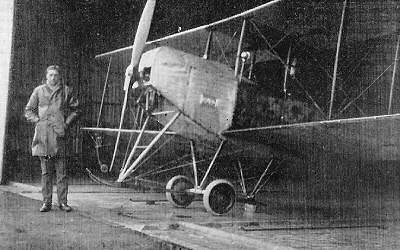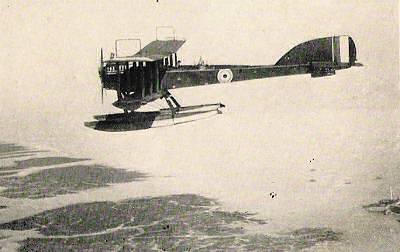|
Again, although the autobiography's lack
of chronology rather tends to muddy Henry's account of
his wartime service he recorded two major events that
took place.
First, he undertook a number of anti-submarine patrols
and during one patrol engaged a German submarine through
bombing, however he felt unable to claim it as sunk, even
though he reported sighting oil afterwards. At the time
he may have been flying a Wight Converted Seaplane as
shown below. (Yet another OV, Lieutenant Charles Stanley
Mossop was awarded the DSC for sinking the German submarine
UB32 by a direct hit with a 1000 lb bomb while flying
a Wight Seaplane when operating from Cherbourg).
The second event was that, during 1918, he claimed the
"kill" of an Albatros while in France to learn
of the latest aerial warfare developments. Throughout
his account, however, he indicated that he was still a
Flying Instructor during the periods that these events
took place.
|

Henry dressed to fly with a training
aircraft
|
|
It is clear that, with flying anti-submarine patrols
and engaging Albatros in France, at some stage during
the Great War he was back in uniform.
The Navy List dated April 1918 records him as having
been commissioned as at 2nd December, 1917 as a Probationary
Flight Officer (Temporary) in the Royal Naval Air Service
(RNAS), at the British Flying School at Vendome in France.
It is believed that here, he could have been under training,
although this is not confirmed and would contradict his
own words.
Service with the RNAS was short-lived with the Royal Air
Force (RAF) being formed from the RFC and the RNAS on
1st April, 1918.
A little more than a year later, London Gazette No. 31416
reported that Second Lieutenant HC Biard RAF was placed
on the Unemployed List as of 22nd May, 1919.
|

A Wight Converted Seaplane on patrol
|